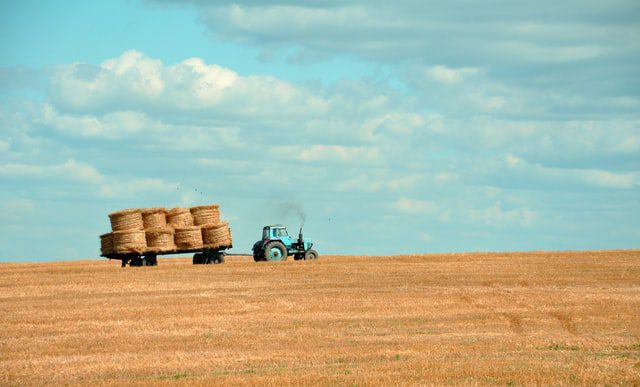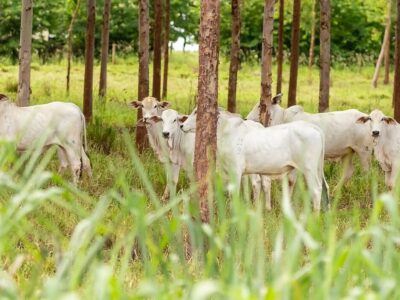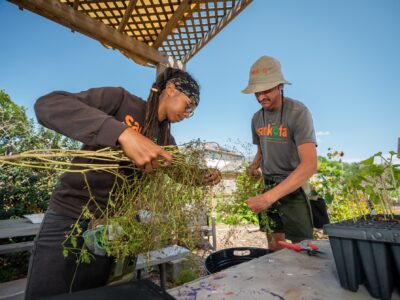On his grandfather’s homestead in South Dakota, Walt Bones runs a farm with his brothers and brother-in-law. They grow corn and soybeans as well as raise cattle and manufacture dairy products. Like most farmers, he faces crop damage from changing weather conditions and the economic woes of falling grain prices.
“My grandpa endured the dirty ‘30s, my father went through the farm crisis of the ‘80s,” says Bones. “The ups and downs are inevitable in this industry.”
The constant stress of farm life coupled with isolation in rural areas can lead to mental health problems for agricultural workers.
Jessica Peters, who runs a dairy farm in Pennsylvania with her parents and brother, began sharing her struggles with mental health online. She’s all too familiar with the toll that long workdays, economic stressors and environmental concerns can take on farmers and rural residents.

“It’s so easy to feel lost and alone in the industry,” she writes. In a 2018 video directed at her fellow farmers, she assures them: “you are not alone, you are not the only one feeling the way you’re feeling. I promise you that.”
Mental health issues within the agricultural community are a longstanding problem. In fact, the Centers for Disease Control and Prevention reports that those in the farming profession are more likely to die by suicide and suicide rates have increased by 40 percent in the past two decades. To help confront this scourge several groups in South Dakota and across the U.S. have established initiatives aimed at supporting farmers and providing much-needed mental health resources.
South Dakota behavioral health organization Avera, started the Farm and Rural Stress Hotline, where farmers can speak anonymously with a trained assessment counselor who will connect callers with mental health resources in their area.
In a public service announcement, South Dakota Governor Kristi Noem applauded the hotline saying, “I farmed and ranched for many years in South Dakota, but what we are seeing now are historically tough times. Flood damage, wet fields, a difficult and unpredictable agriculture environment. It can all add up to a heavy burden of stress.” Agriculture is integral to the South Dakota economy: the state is home to approximately 31,000 farms and ranches.
“Farmers are expected to be tough, but that ‘pull-yourself-up-by-the-bootstraps’ mentality is so unfair to them,” said Matthew Stanley, Clinical Vice President for the Avera Behavioral Health Service Line. Certain cultural attitudes dictate that rural people should be stoic and handle their problems on their own. But that’s not a realistic expectation for anyone, rural farmer or otherwise.

Cynthia Pollich, the organizer of Penn State’s Mental Health First Aid program, recalls encountering this attitude during a conversation with a police officer. Pollich was on the phone with a distressed farmer as a police officer in the background said, “just pull yourself up, you can get over this, you’re fine.” Pollich explained to the officer, “those feelings are real, and they’re allowed to have those feelings, and right now they can’t pull themselves up by the bootstraps.”
Although the Farm and Rural Stress Hotline began in 2019, the COVID-19 pandemic has only underscored the need for these kinds of resources, especially in rural communities that have been hit hard by last year’s events. An American Farm Bureau Federation (AFBF) poll revealed a strong majority of farmers say the pandemic has impacted their mental health and that they have more mental health challenges than they did a year ago.
“My takeaway from this survey is that the need for support is real and we must not allow lack of access or a ‘too tough to need help’ mentality to stand in the way,” said AFBF President Zippy Duvall.
May is mental health month, and in honor of that AFBF launched an online directory of resources for farmers, ranchers, and their families. Entitled the Farm State of Mind, the site lists various hotlines and support groups as well as news, videos, and podcasts on the importance of mental health and warning signs to watch for in family and community members.
“Not only had the pandemic had an impact but looking at trends from 2019 that had continued to become more of a problem, all of that points to the need for this,” says Ray Atkison, communications director of AFBF.
For the first time ever, the 2018 Farm Bill included funds specifically for mental health assistance ($10 million per year for five years). While mental health issues in rural communities are a complex problem with no quick fix, it’s clear that advocacy groups and the federal government are taking it seriously. For those who are struggling and need support, resources are available–and the list is growing.





